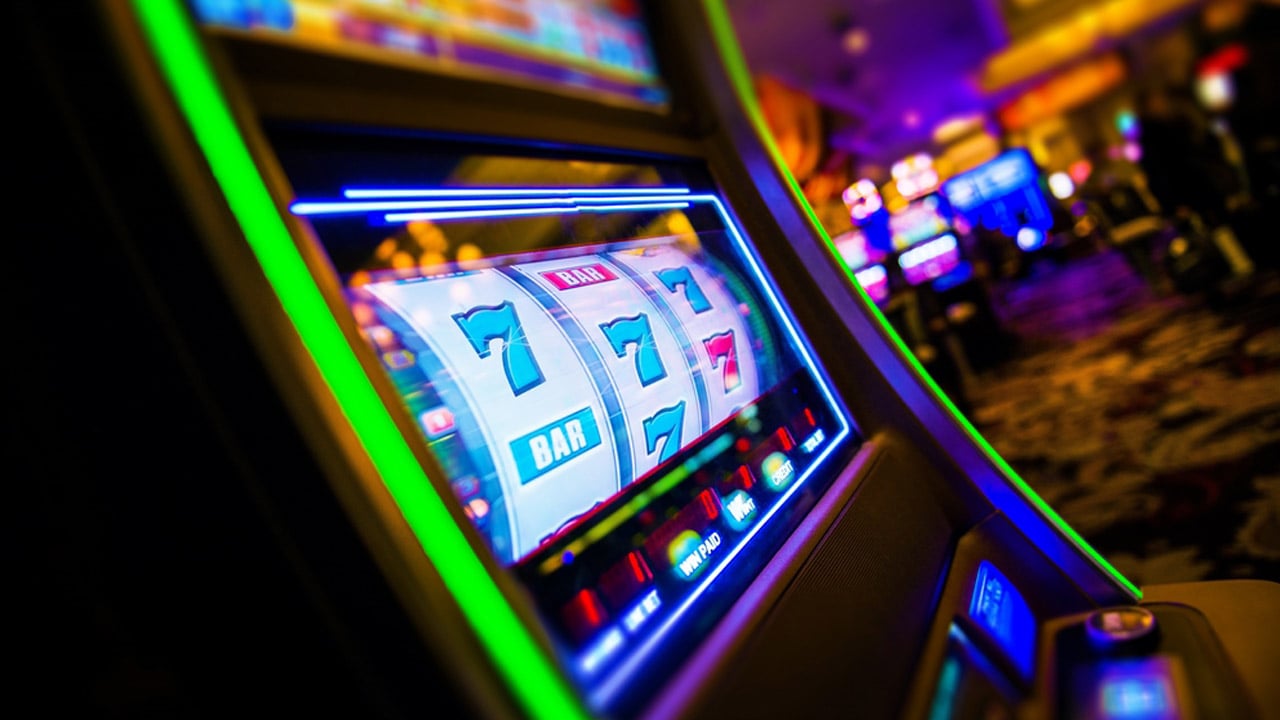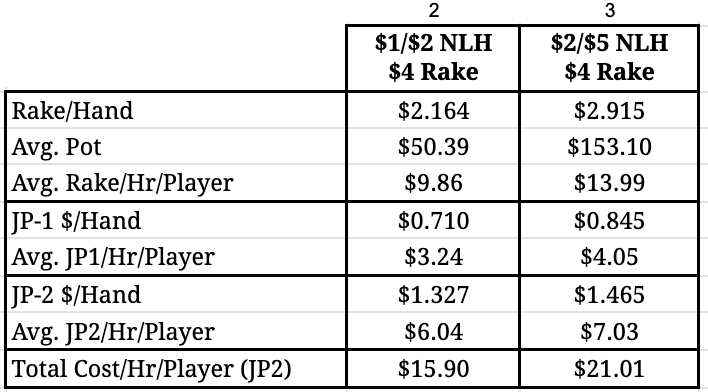My last article made it clear that a typical $4 or $5 rake makes it very difficult to beat small-stakes no-limit hold’em in Las Vegas. Indeed, a standard $4 rake in a $1/$2 game costs the average player about $10/hour.

But rake is not the only “poker tax” we must overcome if we want to be a winning player. In some rooms, we must also contend with the jackpot drop.
Poker room promotions often include high hand bonuses, bad beat jackpots, and other progressive payouts designed to attract players. To fund these efforts, dealers rake extra chips out of qualifying pots. And therein lies both an added challenge, and opportunity, for low-stakes players wanting to maximize their win rate.
The Vegas Jackpot Drop
Stats for Vegas $1/$2 and $2/$5 NLH games are summarized in columns 2 and 3 of Figure 1. This is based on a 10% rake, up to a maximum of $4, as long as there was a flop.
There are two different jackpot structures summarized here. “JP-1” jackpot structure assumes a $1 jackpot is taken whenever a flop is seen with a minimum of $10 in the pot. We can see that the average JP-1 tax was $0.71 per hand in the $1/$2 game.
The “JP-2” structure takes a $1 drop whenever a flop is seen and a second $1 drop whenever the pot reaches $30. This increases the average $1/$2 jackpot tax to $1.33.

The average Vegas $1/$2 JP-1 tax was $0.71 per hand, the average number of players was 8.78 per hand, and the average dealing rate was 40 hands per hour with an auto-shuffler. Therefore, the average player won 4.56 hands per hour. Accordingly, the average amount of JP-1 tax paid per player was $3.24/hour. This is about one-third of the average rake.
The JP-2 jackpot tax is nearly twice as much at $6.04 per hour. If we add the rake and JP-2 jackpot taxes together we pay a total tax of nearly $16/hour in a Vegas $1/$2 game and $21/hour in a Vegas $2/$5 game.
Tom Terrific, who earns $15/hour playing $1/$2, needs to make $31/hour pre-tax if he never gets back any of his jackpot tax. Luckily, all of the jackpot money must be returned to the players, at least in Nevada. So we can make a case that the jackpot drop does not actually cost us any money in the long run. Is this a reasonable assumption?
Monster Progressives, Freeroll Refunds
Many casinos return most of the jackpot money by way of monster progressives, such as a $200K bad beat jackpot. While it is statistically true that we all own a piece of this jackpot pool, we will rarely see any of it, sometimes a table share. If your casino puts most of its jackpot money into this kind of monster jackpot, we should just assume that our jackpot tax is equivalent to an additional rake tax, and it becomes an overhead cost we must overcome.
Station Casinos stages a $300,000 freeroll tournament, requiring 120 hours of cash game play during a three month period. First place is $50,000, and every qualifier automatically receives $120 for showing up. This $120 represents 1/6 of the average jackpot drop for 120 hours of play. But since we can accumulate double hours by playing at certain times, it can represent as much as 1/3 of our jackpot tax.
This prize pool is entirely funded by jackpot drops and represents a big chunk of the overall jackpot drop during the qualifying period, so it is very important that we play enough hours to qualify. If we do not, we relinquish our “equity” in the prize pool.
Clearly, some cash game players will not play in the freeroll. This can be players who do not play enough hours or tourists who will not be in Las Vegs during the tournament. These players are effectively subsidizing those who play the free roll.
So when a card room offers such a freeroll, we should make sure we qualify and play. It not only returns a portion of our jackpot tax, it provides an “overlay” paid for by the players who don’t play.
Special Jackpot Payouts
The Red Rock card room has a “quad-flopper” promotion every Tuesday, Thursday and Saturday, when flopping quads is worth $500. We are dealt a pocket pair once every 17 hands (on average), and we will flop quads about once every 400 times we see the flop with the pair. So we expect to flop quads about once every 170 hours, at 40 hands/hour. During this time, we would have paid about $1,030 in jackpot rake, so the quad-flopper jackpot represents about half of the jackpot tax we have paid.
Playing on quad-flopper days is very important if we want to claw back a big chuck of our jackpot tax. Those who play only on Fridays or Sundays are essentially subsidizing us. We can play quad-flopper Tuesdays with an overlay.
There may be other jackpot payouts which apply only to special days or situations. When we have a choice of when to play, we should try to match our choice with the times when there are special jackpot promotions.
Continuous Jackpot Payouts
Some jackpot payouts apply every day and at any time. For example, the Red Rock card room has a progressive quad flopper that applies to a single hand (say quad fours). They also have a “good beat” jackpot, as well as payoffs for straight flushes. These apply 24 hours a day, 7 days a week, so we can realize our jackpot equity for these payouts whenever we play.
Conclusion
Jackpot drops can have a major impact on our cash game profitability if we pay no attention to the manner in which the jackpot money can come back to us. We should try to play at those times when special jackpot payouts are available, such as quad-flopper Tuesday or qualifying for a freeroll.
Not only does this minimize our jackpot overhead, but also we can claw back more than our fair share of the jackpot tax, because the special jackpot payouts are subsidized by players who do not participate in them.
Steve Selbrede has been playing winning poker for 20 years and is the author of six books: The Statistics of Poker, Beat the Donks, Donkey Poker Volume 1: Preflop, Donkey Poker Volume 2: Postflop, Donkey Poker Volume 3: Hand Reading and Tournament Poker for the Rest of Us.


